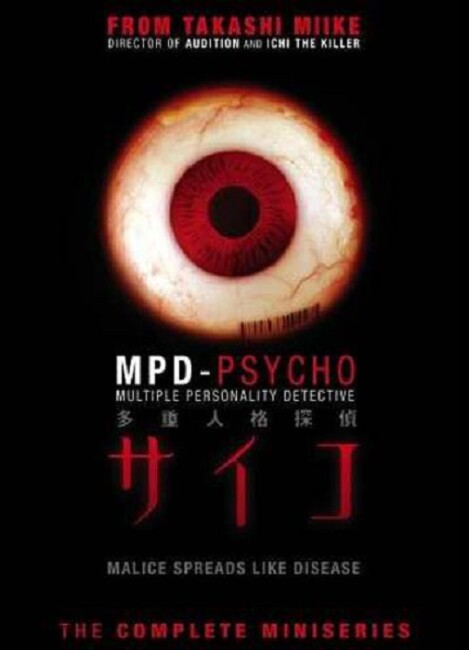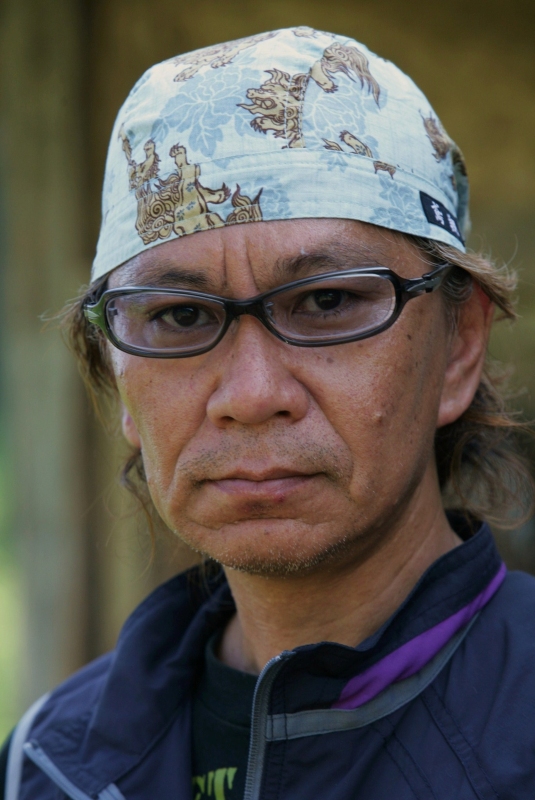
Rating:
★★
(Tajuu Jinkaku Tantei Saiko – Amamiya Kazuhiko no Kikan)
Japan. 2000.
Crew
Director – Takashi Miike, Screenplay – Eiji Ohtsuka, Gichi Ootsuka & Yumi Sirakura, Based on the Manga by Eiji Ohtsuka, Producers – Naoki Abe & Toshiro Sato, Photography – Naosuke Imaizumi, Music – Tsugutoshi Goto & Yumi Shirakura. Production Company – Excellent Film/Kadokawa Shoten Publishing Co./MPD Psycho Project/Pony Canyon/Toskadomain Co. Ltd/WoWow.
Cast
Naoki Hosaka (Yosuke Kobayashi/Kazuhiko Amamiya), Ren Osugi (Tooru Sasayama), Tomoko Nakajima (Machi Isono), Sadaharu Shiota (Masaki Manabe), Rueko Miura (Chizuko Honda), Shun Ichijo (Hisashi Shimazu), Shun Sato (Saku Oye)
Plot
Police detective Yosuke Kobayashi has been suffering from multiple personality disorder since the murder of his wife. The other personality Shinji Nishizono leaves Yosuke’s body during the pursuit of a suspect, allowing Yosuke to re-emerge. Yosuke is immediately recruited by Machi Isono who heads a special task force dedicated to tracking down the followers of the late terrorist/pop star Lucy Monostone. The followers are taking people over and leaving a bar code on the possessed person’s left eyeball. Yosuke’s old partner, police detective Tooru Sasayama, asks his aid as they investigate various cases where Shinji Nishizono possesses a succession of bodies that each have had an experimental chip placed in them.
Japan’s Takashi Miike has become regarded as a cult director. Miike made a name for himself in the early 2000s with films like Audition (1999), Ichi the Killer (2001) and Visitor Q (2001) that were celebrated by audiences because of the ultra-violent and taboo-defying extremes he pushed the material. Miike has been prolific since the early 1990s, putting out 3-4 films per year, sometimes twice that. It could also be noted that after reaching a point of acclaim, Miike began to veer off into a series of experiments that left everybody scratching their heads with the likes of Big Bang Love, Juvenile A (2006), Sukiyaki Django Western (2007), God’s Puzzle (2008), YatterMan (2009) and Yakuza Apocalypse (2015). (See bottom of page for a full list of Takashi Miike’s other genre films).
MPD Psycho was a TV Mini-Series that aired in six one-hour episodes on Wowow, the Japanese satellite broadcasting network. It is based on the manga by Eiji Ohtsuka that was published between 1997 and 2016. The mini-series was made around the period in the early 2000s when Miike’s acclaim had peaked with works like Audition and Ichi the Killer. On the other hand, MPD Psycho failed to garner the same kind of cult buzz that his other films from around this period did.
In viewing it, it is clear to see why MPD Psycho doesn’t rank up there with the other celebrated Miike works – it is terminally confused. In contrast to a film, a mini-series should use its greater running time to take greater ease in the telling of its plot. However, MPD Psycho often seems like a work of random elements where it is not clear why things are happening. While each episode has Yosuke facing a new threat from Shinji Nishizono and there is an overall structure about what is going on, much of the series would have failed muster in say the regular environment of a US tv studio.
The mini-series involves a complex plot that involves the personality of Shinji who it would appear was possessing detective Yosuke – some flashback scenes to tell what happened and with Yosuke’s wife would have helped no end. At the outset, it appears that Shinji has emerged from Yosuke’s body and is running amok and possessing other people. These are people that have been implanted with P-Net chips and have a barcode imprinted on their left eyeball. For some reason, Shinji is also able to randomly pass through other bodies simply by touch – on a couple of occasions, we see him pass right through all the pupils of a school lined up. Things are explained somewhat at the ending but it still feels an excessively complicated explanation involving an organisation creating perfected human beings, personality uploads, electronic chips and a terrorist pop star.
We have had assorted film about Multiple Personality before. These have included the likes of Primal Fear (1996), Me, Myself & Irene (2000) and Frankie & Alice (2010) to genre examples such as The Other (1972), Sisters (1973), Raising Cain (1992), Fight Club (1999), Identity (2003) and Split (2017) – for more detailed discussion see Films About Split Personality. Usually such a role is regarded as an acting tour-de-force and actors like Joanne Woodward in The Three Faces of Eve (1957) and Sally Field in Sybil (1976) have won awards for such roles. On the other hand, Takashi Miiike seems disinterested in the multiple personality aspect. It is not even possible to tell when Naoki Hosaka is inhabited by one personality or the other. In actuality, the multiple personality aspect is of zero relevance to the story and what we have should be considered more of a possession story than a split personality film.
Takashi Miike does not help by directing in a very confusing style filled with ragged camerawork. It often feels as though Miike was shooting quickly and with no concern for whether he had a finished script or not. There are also times when Miike gives all indication he is not taking the proceedings seriously – in one episode, we have a killer turning victims into human flowerpots. Several of the episodes begin with scenes where detective Ren Osugi assisted by Sadaharu Shiota gives a lecture to a hall full of stony-faced police officials where his demonstrations turn into song-and-dance numbers, Christmas pantomimes and/or involve puppets.
Every so often, the mini-series has some striking and surreal visuals – the image of Naoki Hosaka and Tomoko Nakajima having a conversation amidst bright golden light and what looks like snow coming down. There is a reasonable scene in Episode 3 reminiscent of the film Fallen (1998) where Shinji Nishizono passes through the bodies of a group of teenagers at a high school as Naoki Hosaka shoots at the students trying to stop him. Though much of Miike’s characteristic violence has been watered down for television, there is the odd scene – a high school shooting (with Chiaki Kuriyama as the shooter) or a scene where someone’s throat being slit and the killer calmly pops an umbrella to shield themself from the arterial spray;



